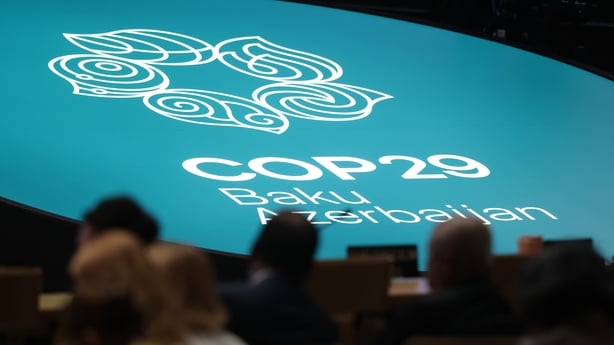Bringing climate action and supporting the least developed countries is at the heart of Ireland's position on climate finance, according to Ireland National Statement to COP29 delivered by Minister for Environment, Climate and Communications Eamon Ryan in Baku.
He told the delegates that Ireland wants access to quality, reliable and accessible finance to be ensured, especially for the Least Developed Countries and the Small Island Developing States.
Three years ago, at COP26, Ireland committed to providing €225 million in bi-lateral climate finance by 2025.
This represented a more than doubling of climate by Ireland since 2020. Mr said the Government is on course to deliver that money on time.
We need your consent to load this rte-player contentWe use rte-player to manage extra content that can set cookies on your device and collect data about your activity. Please review their details and accept them to load the content.Manage Preferences
Ireland’s bi-lateral climate finance is entirely grant based and over 80% is directed to adaptation, whether in whole or in part.
This includes a strong focus on providing resources to the Loss and Damage fund set up during last year’s COP28 climate negotiations.
The statement delivered by Minister Ryan began with a reference to perilous times.
It said that in a world ravaged by war and destructive weather patterns, COP29 needs to deliver an agreement on climate finance to give hope for a peaceful future.
"Giving up would be unforgiveable, but success can help restore belief in multilateralism and restore confidence. The prize is not just to stop runaway climate but also to develop a new economy which delivers better sustainable development for all," he said.

The statement noted that 2024 looks set to be the hottest year on record and that June this year marked the 12th consecutive month that the global average temperature breached 1.5C above pre-industrial levels.
"Climate change is not something that happens in the future somewhere over there. It is here right now, and it is already impacting on all of our lives, in particular the lives of the most vulnerable in the poorest countries in the world who have had the least responsibility for harmful emissions.
"Ireland is not immune to climate change. Our small island is becoming warmer and wetter. We see increased rainfall and flooding, affecting our towns, villages and farmland. Marine heatwaves threaten our biodiversity, and higher sea-levels and increased coastal storms lead to further erosion of our coastlines.
"One of the most concerning impacts of climate change for us is the risk of the collapse of the AMOC, or the Atlantic Meridional Overturn Circulation, which brings warmer waters to our high latitude shores.
"If it was to weaken or to collapse - which scientists are now saying could be happening faster than expected - it would mean that our temperate climate would disappear, and we would be faced with freezing temperatures, affecting our agriculture, our food security, and our entire way of life.
"While this is happening off our own shores, we are witnessing the devastating loss of life, livelihoods and nature, being caused by the opposite impact of climate change - extreme heat, wildfires, tropical storms and flooding.
"Ireland is taking action.
"Ireland’s plan and vision for change is set out in our yearly Climate Action Plans, which chart our course to a 51 per cent reduction in GHG emissions by 2030 and ultimately, together with our partners in the EU, to the achievement of net zero by 2050," he told delegates.
Minister Ryan also explained that greenhouse gas emissions in Ireland fell by 6.8% last year against the background of a rising population and a thriving economy and that this trend is continuing this year.
"Increasingly we will see that the adoption of sustainable solutions will be the key driver of economic stability and growth, with investment in green energy providing a cheap, secure and reliable source of power for a global community, sharing in prosperity and fostering peace.
"The heartbeat of this will be renewable energy. We must all implement the energy package agreed in Dubai last year and close the chapter on the fossil fuel era for good.
"We recognise that developing country partners will need support to make this transition and to adapt to the impacts of climate change we are already seeing".








